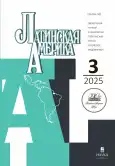The evolution of the modern party system in Catalonia
- Authors: Kurakina-Damir A.A.1
-
Affiliations:
- Center for Iberian Studies, Institute of Latin America
- Issue: No 3 (2025)
- Pages: 58-70
- Section: Iberian aspect
- URL: https://journal-vniispk.ru/0044-748X/article/view/280823
- DOI: https://doi.org/10.31857/S0044748X25030057
- ID: 280823
Cite item
Abstract
The article analyzes the process of transformation of the modern party system of Catalonia from 1980 to 2024, since the stability of the Spanish government largely depends on the balance of power in this region. In the absence of a parliamentary majority, the Chairman of the Spanish Government is forced to rely on the support of regional small parties (including the Catalan ones). The author analyzes the composition of the Catalan parliament based on the results of 14 regional elections and identifies 3 stages of development of the regional party system. From 1980 to 1999 - the stage with a dominant party, from 2003 to 2015 - the stage of growing polarization, the emergence of new players in the electoral field, and from 2017 to the present - the stage of stable instability, when the forces of the main actors are almost equal, but the existing red lines prevent the creation of stable governments. Calculation of such indices as the Effective Number of Parliament Parties and the fragmentation index confirm the validity of the proposed periodization.
Keywords
About the authors
Alexandra A. Kurakina-Damir
Center for Iberian Studies, Institute of Latin America
Author for correspondence.
Email: Kurakina.alex@gmail.com
ORCID iD: 0000-0001-8781-8742
Candidate of Political Science, Senior Researcher
Moscow, B.Ordynka Str., 21References
Supplementary files








